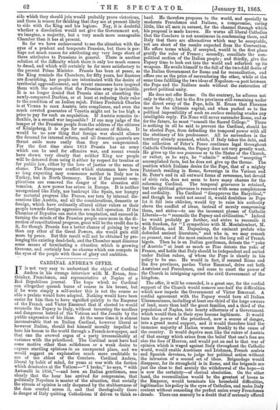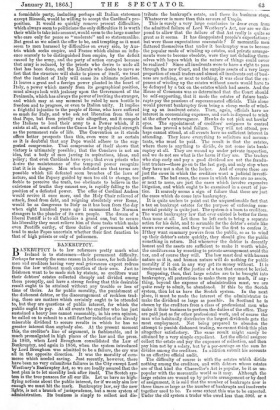CARDINAL ANDREA'S OFFER.
IT is not very easy to understand the object of Cardinal Andrea in his strange interview with M. Ernan, free- thinker, Frenchman, and representative at Naples of a Red Republican journal. The hope which no Cardinal can altogether quench burns of course in his breast, but if he were simply a self-seeker this is not the course so able a prelate would have adopted. Nothing would have been easier for him than to have signified quietly to the Emperor of the French and Victor Emanuel that if elected he would reconcile the Papacy to Italy, without incurring the needless and dangerous hatred of the Vatican and the Jesuits by the public expression of his ideas. At the same time it is almost inconceivable that an Italian Cardinal, however liberal or however Italian, should feel himself morally impelled to bare his bosom to the world through a French newspaper, and that one the avowed organ of a party irreconcileably at variance with the priesthood. The Cardinal must have had some motive other than selfishness or a weak desire to express startling opinions in an unexpected place, and we would suggest an explanation much more creditable to one of the ablest of the Conclave. Cardinal Andrea, liberal by habit of mind, for years at war with the faction which dominates at the Vatican—" I broke," he says, "with Antonelli in 1856,"—and born an Italian gentleman, sees clearly that the hour has arrived for compromise, that politically Napoleon is master of the situation, that socially the stream of opinion is only deepened by the stubbornness of the dam erected across it, and that theologically there is danger of Italy quitting Catholicism if driven to think so hard. He therefore proposes to the world, and specially to moderate Frenchmen and Italians, a compromise caring little, like all men in earnest, for the channel throng:h which his proposal is made known. He warns all liberal Catholics that the Conclave is not unanimous in oondemning them, and Italy that there are alternatives which may be acceptable, yet are short of the results expected from the Convention. He offers terms which, if accepted, would in the first place gratify the ruler of France ; secondly, conciliate the non- political section of the Italian people ; and thirdly, give the Papacy time to look out into the world and refurbish up its weapons. He avails himself to the full of the two-fold desire of the Italian Government for Rome and for reconciliation, and offers one as the price of surrendering the other, while at the same time fulfilling the two ideas of Napoleon—a pact between the Pope and the Italians made without the restoration of perfect political unity.
He does not offer Rome. On the contrary, he adheres not only to the city, but to the five provinces still remaining under the direct sway of the Pope tells M. Ernan that Florence must be the ultimate capital, and when pushed as to the political impossibility of such an enclave enduring evades any intelligible reply. Pio Nono will never surrender Rome, and as for the future, he must "consult the Sacred College." There is nothing in all he said to prevent the Cardinal, should he be elected Pope, from defending the temporal power with all the obstinacy of his predecessor. All he surrenders is the territory already annexed, which, if Italy takes the debt, and the collection of Peter's Pence continues legal throughout. Catholic Christendom, the Papacy does not very greatly want.. He gives up the non possumus as to the States of the Church, or rather, as he says, he " admits " without "accepting accomplished facts, but he does not give up the throne. The position which Italians desire for the Pope, that of a mighty Patriarch residing in Rome, Sovereign in the Vatican and St. Peter's and in all outward forms of reverence, but devoid of civic rule, does not seem to have many charms for the reforming Cardinal. The temporal grievance is retained, but the spiritual grievance is removed with some completeness and cordiality. The Cardinal "disapproves the Encyclical," and though he could not annul it, would doubtless as Pope- let it fall into oblivion, would try to raise his authority above the conflict of ideas, instead of merely compressing them, and strive—to use the incessant phrase of Catholic Liberals—to "reconcile the Papacy and civilization." Indeed he would probably go further, and strive to reconcile it with freedom, for "I sympathize with M. Moutalembert, M. de Pelham, and M. Dupanloup, the eminent prelate who. defended ancient literature," and who is, we may remark en passant, one of the most eminent in the long roll of French bigots. Then he is an Italian gentleman detests the "yoke of Austria" at least as much as Pius detests the yoke of France, and holds that Italy should be independent and united under Italian rulers qf whom the Pope is clearly in his policy to be one. He would in fact, if secured Rome and the five provinces, pardon Victor Emanuel, drive out both Austrians and Frenchmen, and cease to exert the power of the Church in intriguing against the civil Government of the kingdom.
The offer, it will be conceded, is a great one for the cordial support of the Church would remove one-hall the difficulties which now impede the Government of Victor Emanuel. A cordial agreement with the Papacy would turn all Italian Ultmmontanes, including at least one-third of the large owners of land, more than half the great families, and a third of the. population of Naples, into hearty adherents of a Government which would then in their eyes become legitimate. It would turn the power of the priesthood, now a source of danger, into a grand moral support, and it would therefore bind the immense majority of Italian women frankly to the cause of the country. It would deprive men like the rulers of Austria of that energy which arises from the belief that one's foes are also the foes of Heaven and would put an end to that war of opinion which is waged against Italy throughout the Catholic world, would enable Austrians and Irishmen, French zealots and Spanish devotees, to judge her political action without the intrusion of a second set of ideas. Brigandage would disappear, for its stronghold is in Rome, and the brigands are just the class to feel acutely the withdrawal of the hope—it is now the certainty—of clerical absolution. On the other hand, the reconciliation would be the greatest of boons to the Emperor, would terminate his household difficulties, legitimatize his policy in the eyes of Catholics, and make Italy content without conceding the perfect union every Frenchman dreads. There can scarcely be a doubt that if seriously offered a formidable party, including perhaps all Italian statesmen except Ricasoli, would be willing to accept the Cardinal's pro- position. It would so quickly remove present difficulties, which always seem to politicians the only difficulties it is worth their while to take into account,would seem to the large number who care only for peace so "moderate" and so statesmanlike. But great as we admit the offer to be, and tempting as it must seem to men harassed by difficulties on every side, by Aus- tria which seeks empire, and France which claims an influ- ence scarcely to be distinguished from empire, by the deficit caused by the army, and the party of action enraged because that army is reduced, by the priests who desire to undo all that has been done, and die Liberals who desire to move so fast that the structure will shake to pieces of itself, we trust that the instinct of Italy will cause its ultimate rejection. It leaves a great and a foreign power planted in the heart of Italy, a power which merely from its geographical position, must always look with jealousy upon. the Government of the Peninsula, which has always the power of inviting the stranger, and which may at any moment be ruled by men hostile to freedom and to progress, or even to Italian unity. It implies a frightful injustice to the people of Rome, who have suffered so much for Italy, and who ask not liberation from this or that Pope, but from priestly rule altogether, and it compels the Italians to lend their army to a Power which, if it exists at all, must enforce the Canon Law by physical strength as the permanent rule of life. The Convention as it stands offers better prospects than this, even were it as certain as it is doubtful that any Pope would adhere to the sug- gested compromise. That compromise of itself shows that victory is ultimately possible; that the Conclave is not an idea, but a body of men jarring in aspirations, ideas, and policy; that even Cardinals have eyes ; that even priests who desire the maintenance of the temporal power recognize that it is in danger. Men when defeated see that terms are possible which till defeated seem breaches of the laws of nature, and the Papacy guided by men too old to change, too feeble to perceive the truth, too obstinate to believe in the existence of truths they cannot see, is rapidly falling to the position of a defeated power. The offer of Cardinal Andrea would revive it once more, and the Holy Chair relieved of attack, freed from debt, and reigning absolutely over Rome, would be as dangerous to Italy as it has been from the day when eight hundred years ago it summoned the Norman strangers to the plunder of its own people. The dream of a liberal Pontiff is to all Catholics a grand one, but to secure his liberality they must relieve him of those tasks which make even Pontiffs earthy, of those duties of government which tend to make Popes uncertain whether their first function be that of high priests or only of policemen.































 Previous page
Previous page